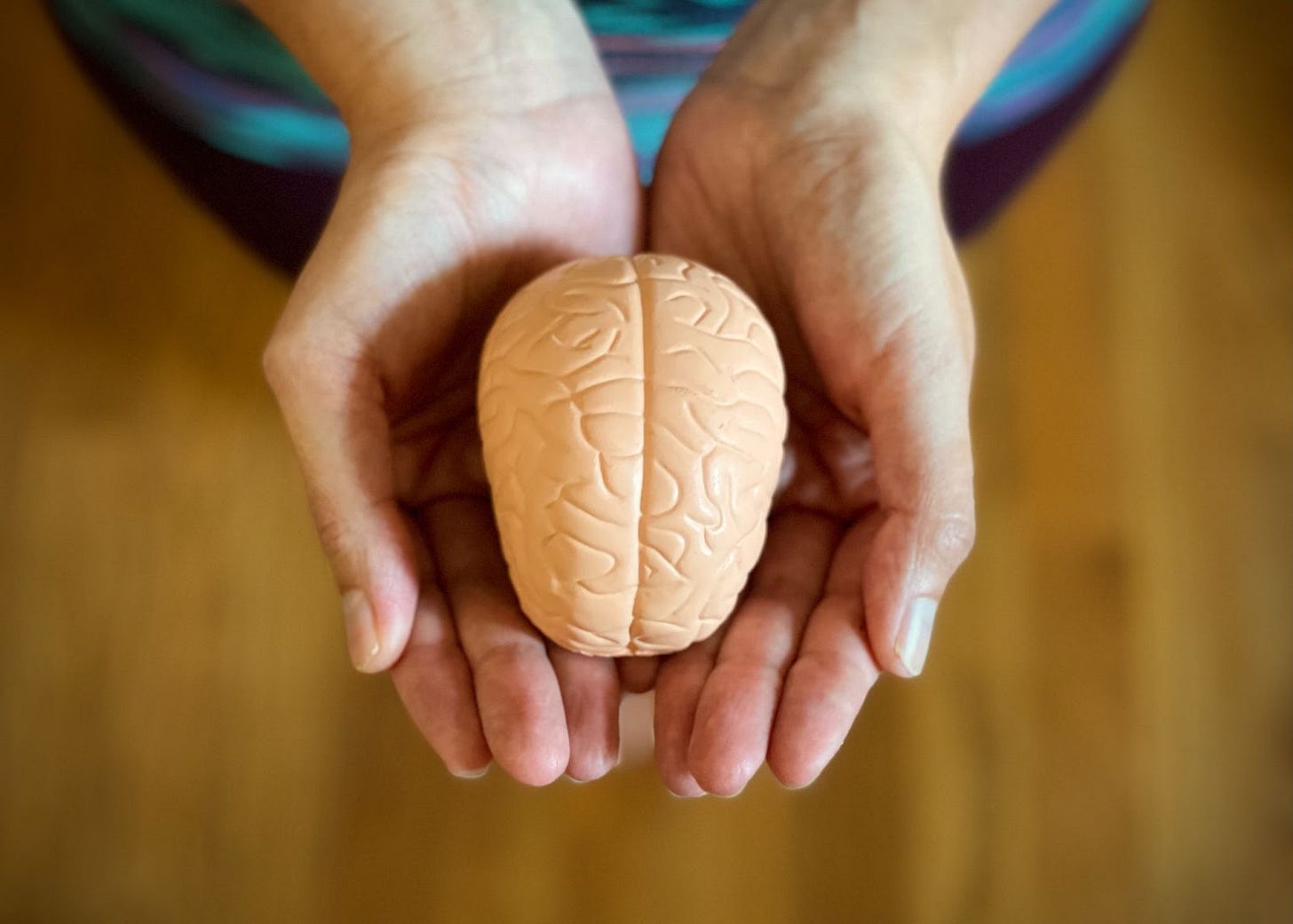Practicing what I preach
I’m taking some time off to care for this sweet dumb brain of mine.
It’s been almost 8 months since I was admitted to the psychiatric ward for postpartum psychosis. In that time, I’ve talked with only a handful of friends about my hospital stay, and not in great detail. I’ve written about the experience just once. And I’ve had only a couple of therapy sessions where I discussed what happened.
In other words, my experience is still pretty raw. It’s still hard to describe. I haven’t given it nearly as much thought as I have with past traumatic events.
And I’m finally ready to change that.
My odds of experiencing postpartum psychosis were low; it occurs in 0.1-0.2% of new mothers. When I learned this fact, I’d replay those numbers in my head, just like I did after Jamie died. The disease that took his life, Fibromuscular Dysplasia, affects between 1-5% of Americans.
Once again, being devastated by a condition so rare seemed like adding insult to injury. After I came home from the psychiatric ward, I would often think about how unlucky I was. Why me? Hadn’t I already gone through enough?
Lately, I’ve been thinking the opposite. As far as people with severe mental illnesses go, I was and am incredibly lucky. I was admitted to a hospital with a psychiatric ward, instead of being stuck in the emergency room, like so many mental health patients are. I had my own room. I was cared for by kind nurses, many of whom were mothers and were especially compassionate to my situation. I had insurance to help cover the astronomical costs of my 72-hour stay. I was given affordable medication and a clear follow-up plan with a psychiatrist. I received the help I needed immediately.
When I consider how people with severe mental illnesses are treated — socially and medically — I realize how incredibly fortunate I am. I think about the people who were in the psychiatric ward at the same time I was. Whatever happened to the young man in the wheelchair who sometimes moaned and sometimes laughed in the room next to mine? What about the woman who paced up and down the hallway, pausing long enough to offer a compliment to anyone who walked past? And what about the elderly man who never left his bed and didn’t speak to anyone?
These patients were my peers. They are people that, admittedly, I previously wouldn’t have expected to interact with in such an intimate way. But for those 72 hours, they were my close neighbors. I like to imagine that they’re all doing as well as I am now, but I fear that may not be true.
I am lucky. And I don’t want to take that for granted.
I’ve given a lot of thought, and dedicated a lot of words, to the fact that our lives are fragile. We can’t predict when we will die or how we’ll lose the people closest to us. Until recently, though, I hadn’t deeply considered how similarly fragile our minds can be. After experiencing postpartum psychosis, I now know how easily we can slip into a state of delusion.
Perhaps the scariest part of my experience was how real it felt. I was convinced that life was an elaborate simulation, that everything around me represented some kind of secret message, and that I could operate just fine — actually, even better than ever! — without getting any sleep.
The good news about postpartum psychosis is that it’s a temporary condition. My psychiatrist reassured me that I wouldn’t be at risk of a relapse unless I gave birth again. Still, it’s more important than ever to prioritize taking care of my mental health — and, as of late, I haven’t been able to properly do that.
That’s why I’ve decided to take six weeks off from writing this newsletter. I need to give myself time to focus on my mental well-being. During this break, I’m hoping to find a new therapist, return to my meditation practice, enjoy a few hikes, and stop working so damn hard.
Choosing to prioritize my mental health meant that something in my life had to give, and the obvious answer was this newsletter. Don’t get me wrong; I absolutely love writing these essays and interacting with readers! But I need to practice what I preach. If I can’t pause My Sweet Dumb Brain in order to care for my sweet dumb brain, then what’s the point of this newsletter?
I will continue sending short and sweet updates on Fridays to paid subscribers throughout my time off. If you’d like to receive those, we’d love to welcome you to the community! Otherwise, I’ll return to your inboxes on Tuesday, August 24.
Take care, friends.
xoxo KHG
p.s. What topics would you like to read about when I’m back? Do you have pressing questions for me or a big worry that’s been nagging you? I’d love to hear what’s weighing on your sweet dumb brain. Some of my favorite essays, like this one, were inspired by messages from readers. Reply to this email, leave a comment, or send me a message.
💖 Sharing is caring


I thought this was a good time to throw back to this post about my postpartum psychosis experience. So many people, like Julie, also bravely shared what they went through. Sometimes I go back and read those messages and it helps me feel less alone.
Although My Sweet Dumb Brain is going on hiatus, word of mouth still matters! Please consider sharing this newsletter on social media, recommending it to a friend, or — if you haven’t yet — becoming a paid subscriber.
My Sweet Dumb Brain is written by Katie Hawkins-Gaar. It’s edited by Rebecca Coates, whose sweet, dumb brain is also in need of a recharge and refresh.




💓 🌷 glad to hear that you are prioritizing your mental health. I wish our society could normalize this! 🙏🏻
I love your newsletter! I recently quit my soul/life-sucking job to spend more time with my family, work on bettering my health and do more ministry work that I love, which also helps fill up my tank. But I am realizing that even with work that I love, I'm needing to take more frequent breaks. I want to appreciate this gift my husband has given me to let me quit the job and get "healthier."